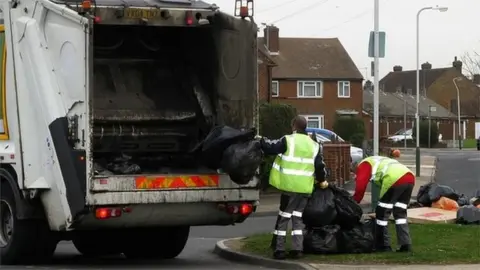Covid: Welsh councils hit for £325m during pandemic
 Getty Images
Getty ImagesWelsh councils are facing financial costs of £325m over the first six months of the Covid-19 pandemic, according to Wales' spending watchdog.
Costs have increased by £165m, where education and social services are the biggest drivers.
But income levels have fallen by £160m, with drops in leisure and cultural services causing the biggest impact.
Auditor general Adrian Crompton said the financial costs of the pandemic were "unprecedented in modern times".
In May, the body representing Welsh councils said it would take a generation for them to pay for the pandemic.
In its report Audit Wales said an additional £500m of Welsh Government funding had mitigated the costs.
But auditors said there may still be a "significant funding shortfall" for the rest of the financial year "depending on the future course of the pandemic".
In the report, looking at the financial sustainability of councils as a result of Covid-19, Audit Wales says the "sustainability of some services may be under threat with particular pressures likely to be felt in areas such as leisure services and the social care sector."
In the short to medium term, the report says it is likely that:
- Services will incur added costs around the use of personal protective equipment
- Income streams from leisure centres and car parks will be affected because of safety requirements and less demand
- Council tax income will fall because of the economic impact of the pandemic
The report states that "some councils were much better placed than others to weather a financial challenge such as the pandemic".
It looks at levels of usable revenue reserves, held by councils as an insurance policy, as an indicator of a council's financial sustainability.

In total, the financial reserves of Welsh councils increased from £1.09bn in 2019 to £1.18bn in 2020, but eight local authorities saw a decrease in their reserves.
At 5%, Conwy Council had the lowest percentage of reserves relative to the net cost of its services.
Flintshire was on 8%, whilst Blaenau Gwent, Monmouthshire, and Torfaen were on 9%.
Mr Crompton said: "Against a backdrop of existing funding pressures, the financial costs of the pandemic are unprecedented in modern times, and financial challenges go well beyond the more immediate and obvious costs of responding to the crisis.
"Therefore, good strategic financial planning and robust governance and decision-making arrangements have become even more important."
